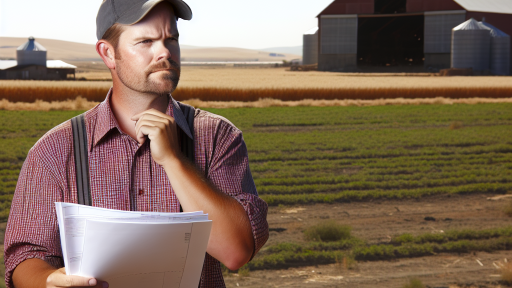Introduction to Farm Finances and Tax Policies
Farm finances play a crucial role in agricultural sustainability.
Understanding these finances helps farmers manage their resources effectively.
Tax policies significantly influence farm operations and profitability.
The Importance of Accurate Financial Management
Accurate financial management ensures that farmers remain competitive.
It allows them to track income and expenses precisely.
Consequently, farm owners can make informed decisions.
Moreover, good financial practices lead to improved cash flow.
Understanding Tax Policies for Farmers
Tax policies are complex, yet essential for farmers.
They determine how much tax a farmer owes and when it is due.
In addition, these policies often provide various deductions.
Farmers should familiarize themselves with tax regulations.
For example, certain expenses may qualify for tax credits.
Key Financial Metrics to Monitor
Monitoring key financial metrics is vital for farm success.
- Gross revenue measures total income from operations.
- Net profit indicates overall financial health.
- Cash flow reveals liquidity and operational efficiency.
By understanding these metrics, farmers can optimize their financial strategies.
Utilizing Tools for Financial Management
Farmers can use various tools for effective financial management.
Transform Your Agribusiness
Unlock your farm's potential with expert advice tailored to your needs. Get actionable steps that drive real results.
Get StartedAccounting software simplifies tracking income and expenses.
Budgeting tools help in planning and forecasting future needs.
Moreover, financial advisors offer valuable insights into tax strategies.
Getting Professional Advice
Seeking professional advice can enhance financial health.
CPA firms specializing in agriculture understand unique challenges.
They help farmers navigate complex tax regulations.
Consequently, farmers often benefit from tailored financial strategies.
Understanding Different Tax Structures for Farming Businesses
Overview of Tax Structures
Farming businesses can operate under various tax structures.
Each structure impacts financial management differently.
Farmers must understand their options to optimize tax benefits.
Sole Proprietorship
A sole proprietorship is the simplest business structure.
It allows farmers to report income on their personal tax returns.
This structure offers minimal regulatory requirements.
However, personal liability for business debts exists.
Transitioning from a sole proprietorship can be complex.
Partnerships
Partnerships involve two or more individuals sharing ownership.
Each partner reports their share of profits on personal returns.
Such partnerships can enhance decision-making and resource pooling.
However, personal liability is still a concern for partners.
Limited Liability Company (LLC)
An LLC combines features of both partnerships and corporations.
It protects personal assets from business liabilities.
Taxation occurs at the member level, avoiding double taxation.
This structure provides flexibility in management and taxation.
Moreover, it requires formal registration and compliance.
Showcase Your Farming Business
Publish your professional farming services profile on our blog for a one-time fee of $200 and reach a dedicated audience of farmers and agribusiness owners.
Publish Your ProfileCorporation
A corporation is a more complex structure for farming businesses.
It offers the highest level of personal liability protection.
However, taxation occurs at both corporate and individual levels.
Corporations must adhere to stricter regulations and reporting requirements.
Many larger farming operations opt for this structure.
Tax Considerations for Each Structure
When choosing a structure, tax benefits are critical.
For sole proprietorships, all income is taxed as personal income.
In partnerships, income is passed through to individual partners.
LLCs enjoy flexibility in tax treatment, choosing between corporate and pass-through taxation.
Corporations face potential double taxation, so careful planning is necessary.
Seeking Professional Advice
Farmers should seek professional advice when determining their structure.
Tax laws can be complex and subject to change.
Consulting with a tax professional can minimize errors.
Moreover, an expert can provide guidance tailored to specific circumstances.
Ultimately, informed decisions can lead to significant financial benefits.
Budgeting and Forecasting: Tools for Effective Farm Financial Management
Importance of Budgeting
Budgeting is crucial for effective farm financial management.
It helps farmers allocate resources wisely.
Moreover, a well-structured budget aids in monitoring expenses.
This process enhances decision-making capabilities.
Creating a Budget
Start by listing all sources of income.
Include crop sales, livestock sales, and government subsidies.
Next, identify all fixed and variable costs.
Fixed costs may include land payments and labor costs.
Variable costs vary with production levels and include seeds and fertilizers.
After organizing this data, you can establish a comprehensive budget.
Utilizing Technology for Budgeting
Various software tools enhance budgeting accuracy.
Programs like FarmLogs and QuickBooks Agriculture streamline the process.
These tools provide real-time financial insight.
They allow farmers to adjust budgets as conditions change.
Forecasting: Looking Ahead
Forecasting predicts future revenues and expenses.
It is vital for preparing for market fluctuations.
Seasonal variations also impact income and expense projections.
By analyzing past data, farmers can anticipate future trends.
Implementing a Forecasting Model
Begin with historical data to create a baseline.
Review previous years’ income and expenses.
Incorporate expected trends in market prices and yield variations.
Adjust forecasts periodically based on current information.
Benefits of Forecasting
Accurate forecasting helps in making informed decisions.
It allows farmers to identify potential cash flow issues early.
Additionally, it enables better investment planning for future growth.
Showcase Your Farming Business
Publish your professional farming services profile on our blog for a one-time fee of $200 and reach a dedicated audience of farmers and agribusiness owners.
Publish Your ProfileCombining Budgeting and Forecasting
Integrating budgeting and forecasting leads to better financial control.
This combination enhances the ability to adapt to changing market conditions.
Farmers can align their financial goals with operational plans effectively.
Ultimately, this integrated approach promotes long-term sustainability.
Uncover the Details: Transitioning To Organic Farming Regulations
Tax Deductions Available for Farmers: A Comprehensive Guide
Introduction to Tax Deductions
Farmers can benefit significantly from tax deductions.
Understanding these deductions can save a lot of money.
In this guide, we’ll explore various tax deduction options.
We’ll help clarify how these deductions can impact your finances.
Commonly Available Deductions
Farmers can claim deductions on several specific expenses.
These commonly include operational expenses and equipment costs.
Keep detailed records of all expenses to maximize deductions.
Operational Expenses
Operational expenses are essential deductions for farmers.
Such expenses may include costs for feed, seed, and fertilizers.
You can also deduct expenses related to utilities and repairs.
Moreover, marketing and advertising costs are also deductible.
Equipment and Depreciation
Farmers often invest heavily in machinery and equipment.
These investments can be depreciated over time for tax purposes.
Deducting depreciation helps lower taxable income significantly.
Be sure to consult tax guidelines for proper asset classification.
Specialized Deductions
Some tax deductions apply only to specific farming practices.
These are often related to sustainable farming or conservation efforts.
Farmers using organic methods may also access unique credits.
Conservation and Environmental Practices
Investments in conservation practices lead to potential deductions.
For example, soil conservation expenses often qualify for deductions.
Moreover, water management practices might provide some tax relief.
Organic Farming Deductions
Organic farmers may deduct costs related to certification processes.
Additionally, expenses incurred in transitioning to organic methods qualify.
Keeping accurate records of these expenses is essential.
Documentation and Record-Keeping
Proper documentation is crucial to claiming deductions.
Farmers should maintain organized records throughout the year.
Consider using accounting software tailored for farmers.
Regularly review and update financial records to avoid errors.
Consulting with Tax Professionals
Tax laws can be complex and frequently change.
Consulting a tax professional can provide significant benefits.
They can help identify eligible deductions specific to your farm.
Moreover, they can assist with compliance and filing requirements.
Maximizing Your Financial Success
Understanding and utilizing tax deductions is vital for farmers.
These deductions can significantly enhance financial management.
With the right knowledge and assistance, farmers can thrive.
Showcase Your Farming Business
Publish your professional farming services profile on our blog for a one-time fee of $200 and reach a dedicated audience of farmers and agribusiness owners.
Publish Your ProfileDelve into the Subject: Trade Policy Changes and Farming
Importance of Record-Keeping and Documentation for Tax Filing
Maintaining Accurate Records
Accurate records serve as the foundation for effective tax management.
Farmers must track income and expenses consistently throughout the year.
This diligence supports not only tax filing but also financial planning.
Furthermore, having detailed records helps in identifying tax deductions.
Types of Records to Keep
Farmers should maintain various types of records for tax purposes.
- Sales receipts provide proof of income received.
- Expense receipts assist in tracking operational costs.
- Bank statements help verify transactions and balances.
- Inventory records reflect the farm’s assets and stock levels.
These documents create a comprehensive financial picture.
Benefits of Documentation
Robust documentation offers significant advantages during tax season.
It simplifies the preparation process by providing organized information.
Additionally, it mitigates stress by ensuring everything is accounted for.
Proper records also serve as protection in case of audits.
Utilizing Technology for Record-Keeping
Many farmers now employ technology for record-keeping.
Accounting software simplifies tracking income and expenses efficiently.
Mobile apps allow for immediate entry of receipts and invoices.
Such tools enhance accuracy and reduce the risk of human error.
Establishing a Record-Keeping System
Creating a systematic approach to record-keeping is essential.
Farmers should determine a schedule for updating records regularly.
Establishing categories for different expenses can streamline the process.
This organized method saves time and effort come tax season.
Learn More: Key Tax Considerations for Small Farmers

Impact of Tax Credits on Farm Profitability and Growth
Introduction to Tax Credits
Tax credits are incentives offered by the government.
They reduce the amount of tax owed, directly benefiting farmers.
Understanding these credits is crucial for financial management.
Types of Tax Credits Available
Various tax credits cater to the agricultural sector.
Some common types include renewable energy credits.
Additionally, credits for conservation practices are available.
Equipment upgrades also qualify for tax incentives.
Maximizing Tax Credits for Farm Profitability
Farmers can optimize their tax credits for financial gain.
First, they should stay informed about available credits.
Next, maintaining accurate records is essential.
This practice ensures they claim all applicable credits.
Moreover, consulting with a tax professional is beneficial.
The Role of Tax Credits in Growth
Tax credits significantly contribute to farm growth strategies.
They allow farmers to reinvest savings back into operations.
Investments can include purchasing new equipment or expanding operations.
Additionally, credits foster innovative practices among farmers.
Case Studies Demonstrating Impact
Several farms have successfully leveraged tax credits.
Green Valley Farms reduced costs by utilizing renewable energy credits.
This initiative resulted in a 15% increase in profitability.
Similarly, Maple Grove Farms enhanced productivity through conservation credits.
Showcase Your Farming Business
Publish your professional farming services profile on our blog for a one-time fee of $200 and reach a dedicated audience of farmers and agribusiness owners.
Publish Your ProfileTheir focus on sustainable practices improved their market position.
Challenges in Navigating Tax Credits
Despite the advantages, navigating tax credits can be challenging.
Many farmers lack knowledge about available options.
Moreover, changing legislation complicates the landscape.
Farmers may also face difficulties with documentation and compliance.
Importance of Tax Policies for Farming Success
Tax policies play a critical role in farming success.
Farmers must actively engage with these financial tools.
By doing so, they can enhance profitability and ensure growth.
Learn More: Implementing OSHA Standards on Farms
Strategies for Tax Planning Throughout the Farming Year
Understanding Tax Deductions
Tax deductions play a critical role in farm finances.
Knowing the eligible deductions saves operators money.
Common deductions include expenses for seed and fertilizer.
Also, equipment purchases may qualify for deductions.
Review the current tax code for specific eligibility criteria.
Effective Record Keeping
Good record keeping is essential for successful tax planning.
It helps track expenses and incomes accurately.
Use accounting software to simplify the process.
Consistently update records after every transaction.
Consider consulting an accountant for best practices.
Timing Purchases Wisely
Strategic timing of purchases can reduce tax burdens.
Accelerating equipment purchases may create immediate deductions.
Evaluate the potential impact of purchases on current tax year.
Lease options might be advantageous in certain circumstances.
Plan capital expenditures strategically throughout the year.
Utilizing Tax Credits
Take advantage of available tax credits to maximize savings.
Research credits specifically designed for farmers.
Credits for renewable energy installations are significant.
Consult with a tax professional to identify applicable credits.
Document all necessary information for claiming credits effectively.
Planning for Seasonal Income Variations
Understand the seasonal nature of farming income.
Plan accordingly to manage cash flow effectively.
Consider estimated tax payments to prevent penalties.
Evaluate income projections throughout the year.
Adjust your tax strategy based on market conditions.
Reviewing Tax Strategies Annually
Regularly review tax strategies to ensure efficiency.
Update financial plans to reflect changes in tax laws.
Set aside time each year for a comprehensive review.
Stay informed about changes that may impact tax responsibilities.
Communicate with your accountant regularly about progress.
Navigating IRS Regulations and Compliance for Farmers
Understanding IRS Guidelines
Farmers must familiarize themselves with IRS regulations.
Showcase Your Farming Business
Publish your professional farming services profile on our blog for a one-time fee of $200 and reach a dedicated audience of farmers and agribusiness owners.
Publish Your ProfileThe IRS provides specific guidelines for agricultural businesses.
These guidelines help in understanding tax liabilities and deductions.
Moreover, compliance reduces the risk of audits.
Key Tax Obligations
Filing taxes accurately is crucial for farmers.
Farmers should submit their tax returns on time.
Additionally, they need to report all income received from farming activities.
Farms with employees must comply with payroll tax regulations.
Available Deductions
Farmers can take advantage of various tax deductions.
Deductible expenses include equipment purchases and maintenance costs.
Other deductions may cover seeds, fertilizer, and labor costs.
Additionally, farmers can deduct some costs related to land improvements.
Record Keeping Requirements
Maintaining accurate records is essential for compliance.
Farmers should track all income and expenses diligently.
These records provide support if audits arise.
Using accounting software can simplify this process significantly.
Navigating Audits and Appeals
Understanding the audit process is vital for farmers.
If selected for an audit, farmers should remain organized.
They should prepare to present their records promptly.
Additionally, farmers have the right to appeal IRS decisions.
Seeking Professional Assistance
Hiring a tax professional can offer valuable guidance.
Tax professionals specialize in agricultural tax laws.
They can help optimize tax strategies and ensure compliance.
Moreover, consulting with an accountant can alleviate stress during tax season.




